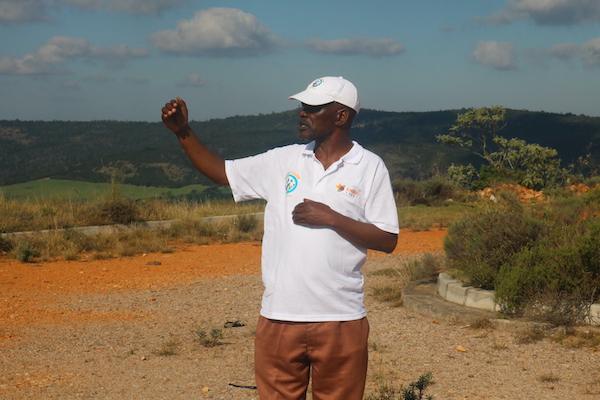By Aphiwe Ngowapi
The collective: Imbumba Yeemboni, translating to “a collective of visionaries”, launched their initiative in Makhanda on Wednesday, 26 June. The launch was a vibrant celebration of the town’s rich history and cultural heritage. Imbumba Yeemboni intends to establish a multi-purpose center in Makhanda to meet the community’s needs by introducing recreational activities that connect locals and visitors with the marginalised heritage of the town.
Photo: Melumzi Matiwane
The event featured a comprehensive tour of significant local landmarks in the townships and outskirts of Makhanda, drawing a group of diverse participants including local organizations, community members, and youth. The tour was guided by Ntsikelelo Maholo, a Makhanda resident.
The tour began at the Dakawa Arts and Crafts Centre, where the guide provided insights into the center’s inception and its role in fostering artistic expression and community development.
Photo: Melumzi Matiwane
The Centre is a community outreach and youth development project that started as the Dakawa Development Centre by ANC exiles during Apartheid, located at The Solomon Mahlangu Freedom College in Dakawa, Tanzania, in 1982. Funded by the Swedish government through SIDA, the project moved to South Africa in 1992, choosing the economically unstable Eastern Cape to create jobs and improve the local quality of life. It evolved into a non-profit trust empowering marginalized people in the region.
The Centre featured a large printmaking studio for linocut prints, a textile printing workshop, a weaving workshop, and groups for beading and sewing. It significantly contributed to the arts and crafts development in Grahamstown and the Eastern Cape. The centre was vandalised and looted a few years ago, losing some important artworks.
The second stop was Ethembeni Old Age Home, a non-residential care facility for the elderly. It provides nutrition, stimulation, and advocacy for retired or disabled individuals, including homebound persons, by supplying meals to them. Here, the elderly engage in activities like knitting and gardening, contributing to their well-being and community spirit.
The tour then moved to eGulfini, an open area with a view of the 1820 Settlers Monument, where Xhosa warriors historically gathered during the Battle of Grahamstown in 1819. Later, the land was intended for development, however this has not been realised, and much of the incomplete structures have been removed. Today, it serves as a site for initiates during initiation season, adding a unique and multilayered element to the tour.
At uNcedo taxi rank, participants viewed a stone statue commemorating Chief Makhanda and the Xhosa warriors who fought in the Battle of Grahamstown at eGazini. The statue apparently caused some controversy regarding where it was built, as the history of certain events has reportedly not been well recorded. Unfortunately, the statue had been vandalized and lacked its original plaque, highlighting the need for preservation efforts.
The tour proceeded to Luvuyo Hall in Fingo Village, known as KwaNdancama, an old cemetery. Here, the group saw the graves of Alban Njube Lobengula’s family, adding a solemn touch to the tour. The Lobengula clan’s sad story is one of exile and unrecognized royalty, buried in unmarked graves far from their ancestral home in Bulawayo, Zimbabwe. While this site represents distinct links between the Makhanda and history of the Ndebele and their last king, much of the structures and grounds stand in disrepair.
The tour was concluded with traditional snacks. Post-meal, the group enjoyed orchestra performances by the Access Music Project (AMP), and Bhodlingqaka, a spoken word poet, musician, and drama artist from the dusty streets of Vukani in Makhanda.
Photo: Melumzi Matiwane
The tour was well-received by local organizations such as the Grahamstown Anti-Crime leaders, visitors, and local youth. Visitors to Makhanda also welcomed the opportunity to learn and engage with a perspective that reflects a more complete history of the town. The event highlighted the importance of preserving and celebrating Makhanda’s historical and cultural assets.
This launch of Imbumba Yeemboni not only provided a platform for historical education but also fostered a sense of unity and pride among the participants, underscoring the collective effort to honour and sustain the rich legacy of Makhanda.
Photo: Melumzi Matiwane
Imbumba Yeemboni will have another tour during Heritage Month this year, with the hopes of formally becoming part of the National Arts Festival in 2025.


